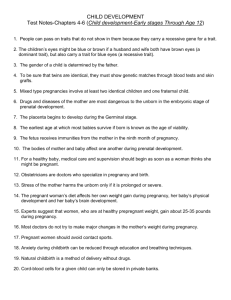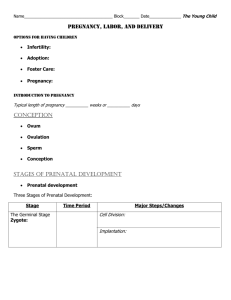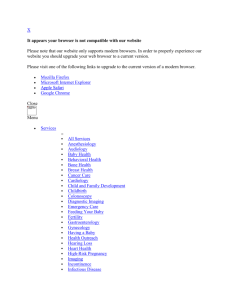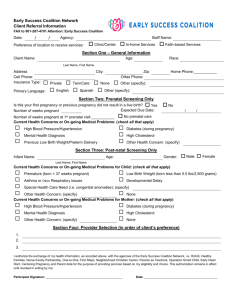PREGNANCY - Intermountain Healthcare
advertisement
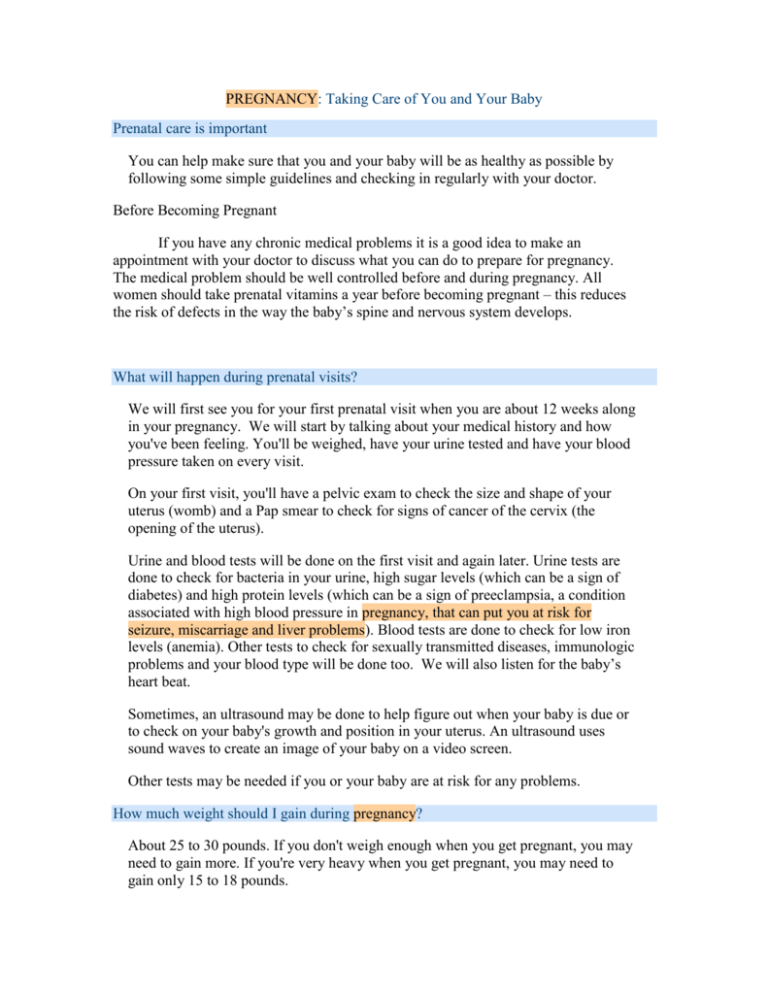
PREGNANCY: Taking Care of You and Your Baby Prenatal care is important You can help make sure that you and your baby will be as healthy as possible by following some simple guidelines and checking in regularly with your doctor. Before Becoming Pregnant If you have any chronic medical problems it is a good idea to make an appointment with your doctor to discuss what you can do to prepare for pregnancy. The medical problem should be well controlled before and during pregnancy. All women should take prenatal vitamins a year before becoming pregnant – this reduces the risk of defects in the way the baby’s spine and nervous system develops. What will happen during prenatal visits? We will first see you for your first prenatal visit when you are about 12 weeks along in your pregnancy. We will start by talking about your medical history and how you've been feeling. You'll be weighed, have your urine tested and have your blood pressure taken on every visit. On your first visit, you'll have a pelvic exam to check the size and shape of your uterus (womb) and a Pap smear to check for signs of cancer of the cervix (the opening of the uterus). Urine and blood tests will be done on the first visit and again later. Urine tests are done to check for bacteria in your urine, high sugar levels (which can be a sign of diabetes) and high protein levels (which can be a sign of preeclampsia, a condition associated with high blood pressure in pregnancy, that can put you at risk for seizure, miscarriage and liver problems). Blood tests are done to check for low iron levels (anemia). Other tests to check for sexually transmitted diseases, immunologic problems and your blood type will be done too. We will also listen for the baby’s heart beat. Sometimes, an ultrasound may be done to help figure out when your baby is due or to check on your baby's growth and position in your uterus. An ultrasound uses sound waves to create an image of your baby on a video screen. Other tests may be needed if you or your baby are at risk for any problems. How much weight should I gain during pregnancy? About 25 to 30 pounds. If you don't weigh enough when you get pregnant, you may need to gain more. If you're very heavy when you get pregnant, you may need to gain only 15 to 18 pounds. Pregnancy isn't the time to diet! It's best to gain about 2 to 3 pounds during the first 12 weeks and about 1 pound a week after that. Talk to your doctor about how much weight you should gain. What should I eat? One of the most important things you can do for yourself and your baby is eat a balanced diet. There are a few foods that you should be more careful about eating while you are pregnant. Meat, eggs and fish that are not fully cooked could put you at risk for an infection. Do not eat more than 2 or 3 servings of fish per week (including canned fish). Do not eat shark, swordfish, king mackerel, tilefish or tuna. These fish sometimes have high levels of mercury, which could hurt your baby. Wash all fruit and vegetables. Keep cutting boards and dishes clean. Eat 3 to 4 servings of dairy foods each day. This will give you enough calcium for you and your baby. Do not drink unpasteurized milk or eat unpasteurized milk products. Soft cheeses such as Brie, feta, Camembert and Mexican queso fresco may have bacteria that can cause infections. If you drink coffee or other drinks with caffeine, do not have more than 1 or 2 cups each day. It is okay to use artificial sweeteners such as aspartame (some brand names: Equal, NutraSweet) and sucralose (brand name: Splenda) while you are pregnant, but you should try to them in moderation. If you have a genetic disease called phenylketonuria, or PKU, you shouldn't use aspartame at all. Should I take vitamins? You should take 400 mcg (0.4 mg) of folic acid every day for the first 12 weeks of your pregnancy. Folic acid can help prevent problems with your baby's brain and spinal cord. It is best to start taking folic acid a year before you get pregnant. I suggest that you to take a prenatal vitamin this will provide the folic acid you need. Make sure you're not taking any other vitamin or mineral supplement along with it unless I recommend it. Is it okay to take medicine? Check with your doctor before taking any medicine, including aspirin. Some medications that are safe during pregnancy include Tylenol, Maalox, Sudafed. Other drugs should not be taken unless it is cleared with me. How long can I keep working? This depends on if you have any problems with your pregnancy, what kind of work you do and if you're exposed to anything at work that could harm your baby. For instance, lifting heavy objects or standing for long periods can be hard on you. Radiation, lead and other heavy metals, such as copper and mercury, could be damaging to the baby. Working in front of a computer screen is not thought to cause harm to an unborn baby. What about exercise? Unless you have problems in your pregnancy, you can probably do whatever exercise you did before you got pregnant. You may feel better if you're active. Try to get at least 30 minutes for exercise each day. Talk to your doctor about any special conditions that you may have. Some women say exercising during pregnancy makes labor and delivery easier. Walking and swimming are great choices. If you didn't exercise before pregnancy, start slowly. Don't overdo exercise. If you can't talk easily while exercising, you are working too hard. Don't get overheated. Be sure to drink plenty of water so that you don't get dehydrated. It's best to avoid anything that could cause you to fall, such as water skiing or rock climbing. Is it okay to have sex? Yes, unless your doctor believes you're at risk for problems. Don't be surprised if you're less--or more--interested in sex. As you get larger, you may find you need to try different positions, such as lying on your side or being on top. If you have oral sex, tell your partner not to blow air into your vagina. This could force air inside you, which could cause an air embolism. Air embolisms can cause permanent brain damage and even death to a pregnant woman and her baby. What can I do to feel better? Here are the most common discomforts of pregnancy and some tips for handling them: Morning sickness -- Nausea or vomiting may strike anytime during the day (or night). Try eating frequent, small meals, and avoid greasy foods. Keep crackers by your bed to eat before getting up. Talk to your doctor if morning sickness lasts past the first 3 months of pregnancy or causes you to lose weight. Tiredness -- Sometimes tiredness in pregnancy is caused by anemia, so tell your doctor. Get enough rest. Take a daytime nap if possible. Leg cramps -- Gently stretch the calf of your leg by curling your toes upward, toward your knee. Constipation -- Drink plenty of fluids. Eat foods with lots of fiber, such as raisins and bran cereal. Don't take laxatives without talking to your doctor first. Stool softeners may be safer than laxatives. Hemorrhoids -- Don't strain during bowel movements. Try to avoid becoming constipated. Clean yourself well after a bowel movement (wet wipes may be less irritating than toilet paper). Take several warm soaks (sitz baths) a day. Urinating more often -- You may need to urinate more often as your baby grows because he or she will put pressure on your bladder. This can't be helped. Varicose veins -- Avoid clothing that fits tightly around your legs or waist. Rest and put your feet up as much as you can. Move around if you must stand for long periods. Ask your doctor about support hose. Moodiness -- Your hormones are on a roller coaster ride during pregnancy. Plus, your life is undergoing a big change. Don't be too hard on yourself. If you feel very sad or think about suicide, talk to your doctor. Heartburn. Eat frequent, small meals often. Avoid spicy or greasy foods. Don't lie down right after eating. Ask your doctor about taking antacids. Yeast infections -- The amount of discharge from the vagina increases during pregnancy. Yeast infections, which can also cause discharge, are more common during pregnancy. It's a good idea to talk with your doctor about any unusual discharge. Bleeding gums -- Brush and floss regularly, and see your dentist for cleanings. Don't put off dental visits because you're pregnant, but be sure to tell your dentist you're pregnant. Stuffy nose -- This is related to changes in the levels of the female hormone estrogen. You may also have nosebleeds. Edema (retaining fluid) -- Rest with your legs up. Lie on your left side while sleeping so blood flows from your legs back to your heart better. Don't use diuretics (water pills). If you're thinking about cutting down on salt to reduce swelling, talk with your doctor first. Your body needs enough salt to maintain the balance of fluid and cutting back on salt may not be the best way to manage your swelling. Skin changes – Stretch marks appear as red marks on your skin. Lotion can help keep your skin moist and may help reduce the itchiness of dry skin. Stretch marks really can't be prevented but they often fade after pregnancy. Other skin changes may include darkening of the skin on your face and around your nipples, and a dark line below your belly button. Staying out of the sun or using a sunscreen may help lessen these marks. They'll probably fade after pregnancy. Call your doctor if you have: Blood or fluid coming from your vagina Sudden or extreme swelling of your face or fingers Headaches that are severe or won't go away Nausea and vomiting that won't go away Dizziness Dim or blurry vision Pain or cramps in your lower abdomen Chills or fever A change in your baby's movements Less urine or burning when you urinate Any illness or infection Anything that bothers you Warnings "Don't do this, don't do that." You've probably heard every old wives' tale. Here are some warnings worth heeding: Don't smoke. Smoking raises your risk for miscarriage, premature birth, low birth weight and many other problems. Don't use drugs. Cocaine, heroin and marijuana increase your risk of miscarriage, premature birth and birth defects. And your baby could be born addicted to the drug you've been taking. Don't drink alcohol. Drinking alcohol during pregnancy is the major cause of preventible birth defects, including mental slowness. Don't clean your cat's litter box, or eat raw or undercooked red meat. You could get toxoplasmosis, a disease that can cause birth defects. Don't sit in the sauna or hot tub. This raises your risk of miscarriage and birth defects. Don't douche without talking to your doctor about it first. Douching could force air into the vagina, which can cause an air embolism. Important points by week of pregnancy 16-20 weeks of gestation – If you have been nauseated, this usually resolves by 1618 weeks of pregnancy. Also about 16 -18 weeks most women feel the baby move for the first time. It is described as a flutter or bubble sensation. At this early stage there are not big bumps or “kicks”. The first Obstetric ultrasound is usually done at 20 weeks. This exam will give information on the placenta, size of the baby and health of the developing organs. Of course the sex of the baby can usually be determined with this exam. Be sure to let the ultrasonographer know if you don’t want to know the sex of the baby, so they won’t slip and give you information you don’t want. You will probably be “showing” with a small tummy bulge at this time. You might consider telling other people that you love that you are expecting at or before this time. This allows you to be the one doing the telling, rather than having to notify others due to their guessing. An interesting thing can happen when you start to show. Perfect strangers may touch your tummy, and feel perfectly at ease doing so. It is as if your pregnancy becomes common ground. For most women this is understandably irritating. Be prepared for this and consider how you will respond before it happens.



